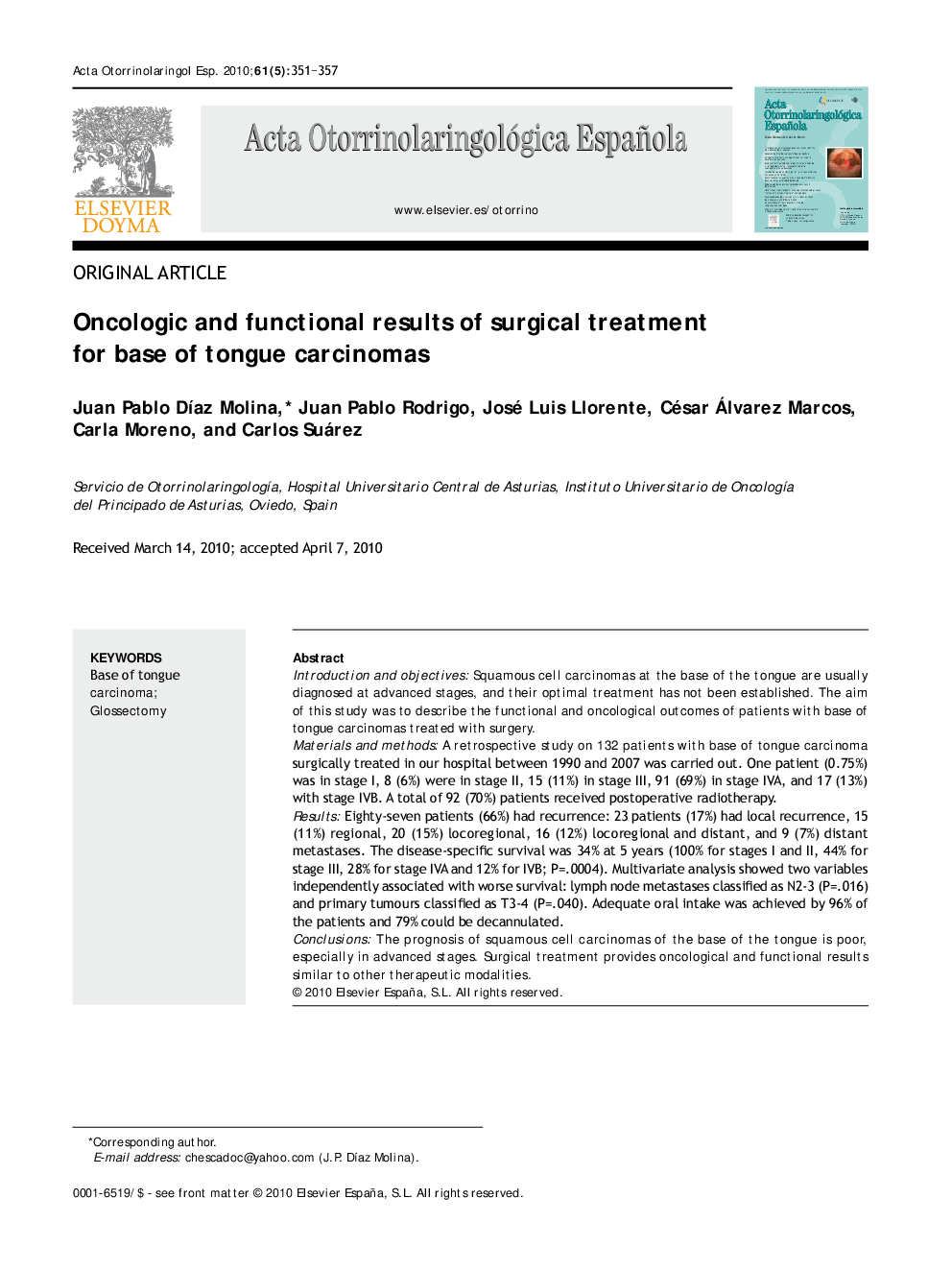| Article ID | Journal | Published Year | Pages | File Type |
|---|---|---|---|---|
| 4101204 | Acta Otorrinolaringologica (English Edition) | 2010 | 7 Pages |
Introduction and objectivesSquamous cell carcinomas at the base of the tongue are usually diagnosed at advanced stages, and their optimal treatment has not been established. The aim of this study was to describe the functional and oncological outcomes of patients with base of tongue carcinomas treated with surgery.Materials and methodsA retrospective study on 132 patients with base of tongue carcinoma surgically treated in our hospital between 1990 and 2007 was carried out. One patient (0.75%) was in stage I, 8 (6%) were in stage II, 15 (11%) in stage III, 91 (69%) in stage IVA, and 17 (13%) with stage IVB. A total of 92 (70%) patients received postoperative radiotherapy.ResultsEighty-seven patients (66%) had recurrence: 23 patients (17%) had local recurrence, 15 (11%) regional, 20 (15%) locoregional, 16 (12%) locoregional and distant, and 9 (7%) distant metastases. The disease-specific survival was 34% at 5 years (100% for stages I and II, 44% for stage III, 28% for stage IVA and 12% for IVB; P = .0004). Multivariate analysis showed two variables independently associated with worse survival: lymph node metastases classified as N2–3 (P = .016) and primary tumours classified as T3–4 (P = .040). Adequate oral intake was achieved by 96% of the patients and 79% could be decannulated.ConclusionsThe prognosis of squamous cell carcinomas of the base of the tongue is poor, especially in advanced stages. Surgical treatment provides oncological and functional results similar to other therapeutic modalities.
ResumenIntroducción y objetivosLos carcinomas epidermoides de base de lengua son habitualmente diagnosticados en estadios avanzados, no habiéndose establecido el tratamiento óptimo de los mismos. El objetivo de este estudio es describir los resultados funcionales y oncológicos de los pacientes con carcinomas de base de lengua tratados mediante cirugía.Material y métodosSe realizó un estudio retrospectivo en 132 pacientes con carcinomas de base de lengua tratados quirúrgicamente en nuestro Hospital entre 1990–2007. Un paciente (0,75%) se hallaba en estadio I, 8 (6%) en estadio II, 15 (11%) en estadio III, 91 (69%) en estadio IVA, y 17 (13%) en estadio IVB; 92 (70%) de los pacientes recibieron radioterapia postoperatoria.ResultadosOchenta y siete pacientes (66%) presentaron algún tipo de recidiva: 23 pacientes (17%) recidiva local, 15 (11%) regional, 20 (15%) loco-regional, 16 (12%) loco-regional y a distancia, y 9 (7%) metástasis a distancia. La supervivencia específica para la enfermedad fue del 34% a los 5 años (del 100% para los estadios I y II, del 44% para el estadio III, del 28% para el estadio IVA y del 12% para el IVB: p = 0,0004). El análisis multivariante mostró 2 variables asociadas de forma independiente con una peor supervivencia: las metástasis linfáticas clasificadas como N2–3 (p = 0,016) y los tumores primarios clasificados como T3–4 (p = 0,040). El 96% de los pacientes consiguieron alimentación oral, y el 79% pudieron ser decanulados.ConclusionesEl pronóstico de los carcinomas epidermoides de base de lengua en estadios avanzados es pobre. El tratamiento quirúrgico obtiene unos resultados funcionales y oncológicos similares a los de otras modalidades terapéuticas.
